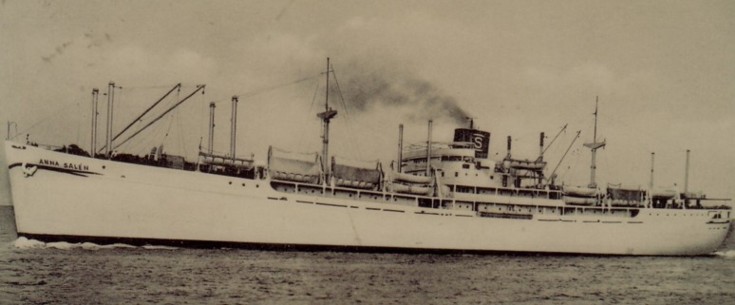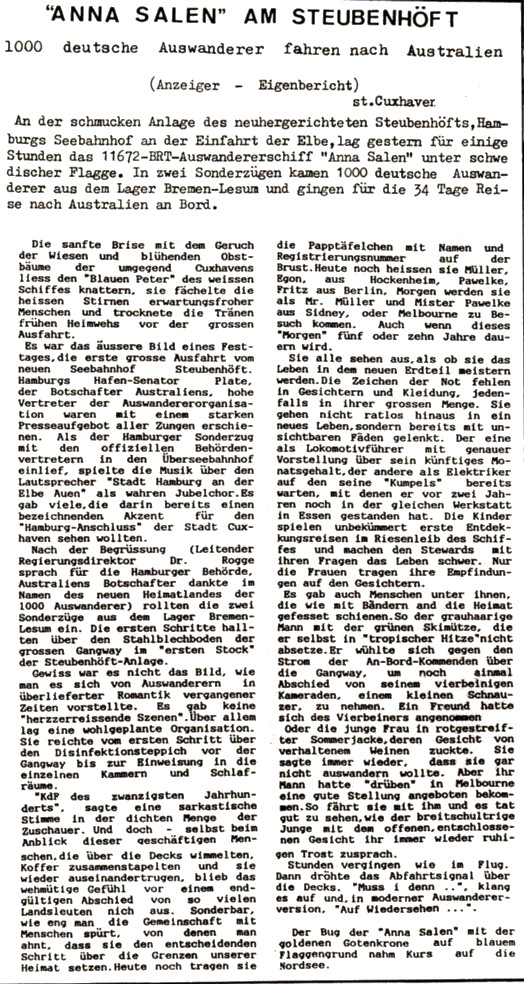BERNHARD MITTELSTEDT (1948- )
I emigrated to Australia with my parents in May 1954.
A postcard (dated May 27, 10 a.m.) from my mother to her inlaws reads:
Diesst ist die letzte Stunde im Lager. In einer Stunde sind wir auf dem Wasser. Gestern Abend grosse Abschieds Feier gehabt. Heute Morgen haben wir Gottes Dienst gehabt. Ich war mit den Kinderchen. Die Untersuchungen hier waren schrecklich. Aber nun haben wir alles Ueberstanden. So ihr Lieben nun bleibt schoen gesund und...noch mals besonderen Dank fuer alles. Die naechste Nachricht kommt von unterwegs.
Nochmals liebe Gruesse
Sohn, Ruth, Kinder.
Drueckt alle Daumen fuer uns!!
Translation:
This is the final hour in the hostel. In one hour we'll be on board. Last night we had a huge farewell party. This morning we had church service. I went with the children. The [medical] examinations here were horrible. But now we've gotten through everything. So, dear ones, stay healthy and...again a special thank you for everything. The next news will come during the journey.
Loving greetings
Son, Ruth, Children
Wish us success!!
Here is a newspaper report about the departure of the Anna Salen:
Translation:
1000 German emigrants travel to Australia
(Anzeiger - internal report)
At the [embarkation] facility of the newly completed Steubenhoeft, Hamburg's ocean terminal at the entrance to the Elbe, there was moored yesterday for several hours the 11,672-ton emigration-ship "Anna Salen" under Swedish flag. 1000 German emigrants arrived in two special trains from the Bremen-Lesum hostel and went on board for the 34-day voyage to Australia.
The soft breeze with the aroma of the meadows and blossoming fruit trees around Cuxhafen fluttered the white ship's blue flag, fanned hot brows of people waiting in anticipation, and dried tears of early homesickness before the great departure.
Superficially it resembled a festival, the first great exodus from the new ocean terminal Steubenhoeft. Hamburg's harbour-master Platte, Australia's ambassador, and high-profile representatives from the emigration organization appeared, attended by all types of media.
As the special train from Hamburg with the official authorities and representatives arrived at the overseas terminal, the music for "Hamburg, City on the Elbe" played over the speaker to a chorus of cheering.
There were many who were ready to see in this a definite emphasis on Hamburg's connection to the City of Cuxhafen.
After the introduction (the leading senior government official Dr. Rogge spoke on behalf of the authorities of Hamburg, and Australia's ambassador thanked the 1000 emigrants on behalf of their new homeland) the two special trains from the Bremen-Lesum hostel rolled in. The front portion stopped on the steel floor of the large gangway on the lower level of the Steubenhoeft facility.
It was definitely not the picture traditionally imagined of emigrants in earlier, romantic times. There were no hearbreaking scenes. Everything was regulated by well-planned organization. This extended from the first step on the disinfection mat in front of the gangway to admission into individual rooms and dormitories.
"KdF [Strength through joy] in the twentieth century," said a sarcastic voice in the dense crowd of spectators. But still, the sight of these bustling people swarming over the decks, stacking their suitcases together and separating them, did not remove the melancholy that precedes the final farewell to so many citizens. It's strange how closely one identifies with people whom one suspects are taking the decisive step away from our homeland. Just today they still wore a card with their name and registration number on their chest. Today they are still Mueller or Egon from Hockenheim, or Pawelke and Fritz from Berlin. Tomorrow they'll visit us as Mr Mueller and Mr Pawelke of Sydney or Melbourne. Even if this "tomorrow" takes five or ten years.
They all look as if they will succeed at life in their new part of the world. Signs of stress are absent from faces and clothing, at any rate on most of them. They aren't going away to their new life ignorant, but are already guided by anticipated opportunities. One goes as locomotive director with an exact idea of his future earnings. Another goes as an electrician for whom his workmates with whom he worked in the same factory in Essen two years ago are already waiting. The children make playful, unworried explorations into the ship's interior and make life for the stewards difficult with their many questions. Only the women are showing their concerns on their faces.
There were also people among them who seemed held to home as if by cords. For example the greyhaired man with the green skiing hat, which he didn't remove despite the "tropical" heat. He pushed against the tide coming on board over the gangway to again farewell his four-legged comrade a small dog. A friend had adopted the four-legged one.
Or the young woman wearing the red-striped summer jacket, whose face twitched with suppressed crying. She declared repeatedly that she did not want to emigrate. But her husband had been offered a good position in Melbourne. Therefore she was going with him, and it was good to see how the broad-shouldered young man with the understanding but determined face repeatedly spoke comfortingly to her.
The hours passed quickly. Then the departure signal sounded over the decks followed by the strains of "Muss i denn..." and the modern emigrants version "Auf Wiedersehen".
The bow of the "Anna Salen" took course onto the North Sea.
The Melbourne newpspaper The Argus (July 2, 1954) noted the arrival of the Anna Salen "Today" from Bremerhaven. Measured from May 27 the voyage was 37 days.
Immigration Bridge is a website where immigrants to Australia can record their immigration story. It has the following report (here with "April" corrected to "May") written by myself:
Story for:
IMMIGRATION BRIDGE
_____________________
For my father Australia meant employment, a free six-week voyage, adventure, owning a house, and safety should the “Cold War” heat up.
Walter Robert Mittelstedt, his wife Ruth Hildegard, my sister Gilda, and myself departed Hamburg in May 1954.
I remember, as the Anna Salen left the wharf, tearfully waving to my grandparents and my father saying, “You will never see them again.” I answered, “When I’m grown up…”, and he responded, “That will take twenty years.”
For a five-year-old the voyage was monotonous. Distractions included the weekly on-board movie, wandering all over the ship and frequently being chased away, watching the African coast, and several trips to shore with my parents. My mother often described an Arab’s attempt to buy her and the haggling over the price.
We arrived at Bonegilla migrant reception centre (Victoria) in winter and felt constantly cold. My father rigged up a bar radiator, suspended it from the ceiling, and powered it from the light-switch wiring. He attended English lessons and proudly announced the first word he remembered — the word “thousand”. In the cafeteria I first encountered a toaster, and regularly sneaked back for more toast.
Next we went by train to South Australia and stayed at Woodside migrant hostel. After that it was the Adelaide suburb of Mansfield Park.
My father built a wooden house in nearby Wingfield and recruited me, then aged 6, to find misplaced tools, straighten bent nails, and do general tidying. He paid me three shillings (30 cents) which bought enough confectionary to last a week. We moved in for Christmas 1955.
My other memories include: Scanning the night sky with binoculars in 1957 for Sputnik I; Planting trees at school on Arbor Day; Saturdays at the Ozone movie theatre in Port Adelaide; and Collecting Australian stamps. In 1959 when television arrived a neighbor often invited me for viewing. The Starline Drive-in theatre, Mansfield Park, had also opened: I often watched movies from outside the fence and helpful patrons turned up the volume of the nearest speakers.
My father did electrical work. He worked for Kelvinator or Holden during the warm months, and in Northern Territory or Queensland from May to October. He returned to Germany in 1963.
My mother worked as nurse-aid and driver for the Spastic Centre. She remarried in 1969 and died in 1993.
Myself, I worked for the Railways but resigned after 2½ years to combine travel with temporary jobs. I saw much of Australia and visited many other countries. Including, after exactly 20 years absence, Germany and found both my grandparents still alive.
In 1976 I returned to school via the Mature Age Matriculation Scheme and borrowed to buy a house. At University my finances ran out, but I remembered my childhood stamp collection, and selling stamps got me through.
My sister was intellectually handicapped and went to Hillcrest Institution and Minda Home. In her thirties she learned to read and write, overcame severe stuttering, learned normal behavior with help from the Lutheran Church, and now lives with me.
After our mother’s death our father visited from Germany and helped me establish a holiday house on Kangaroo Island. He then came to Australia every summer to travel around, and stay on KI with me. This continued until 2006 when he was 84.
My parents' decision to live in Australia turned out correct. It's doubtful our lives would have been as good anywhere else.
www.immigrationbridge.com.au/

